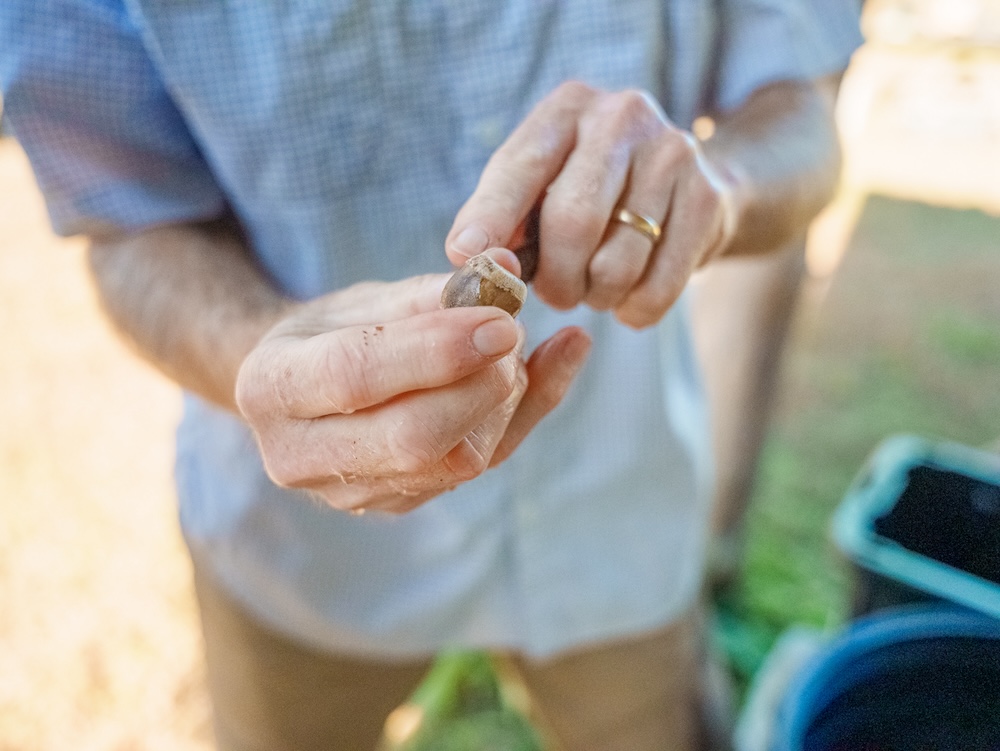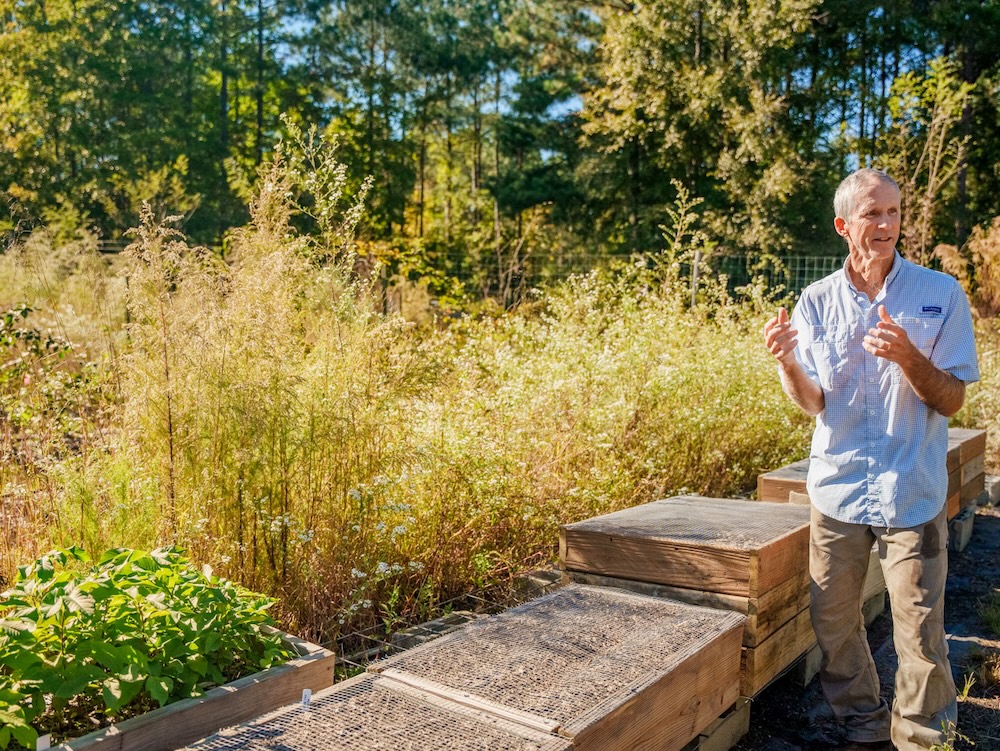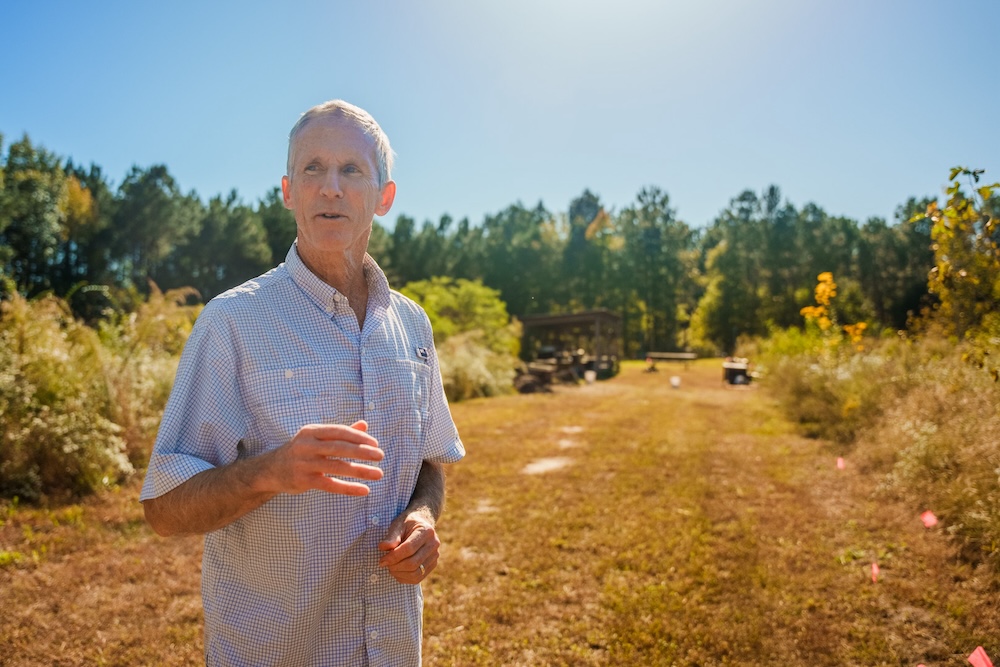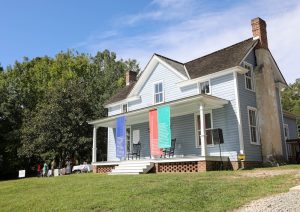The message went out over a neighborhood listserv this fall with an unusual request: a plea for native tree seeds.
“These seeds will be grown into saplings that will be used in local plantings or given to the public — for FREE!” the message read.
The seeds in question are planted by Clay Bordley at Panther Creek Forest Farm, a 28-acre expanse of land in Durham. Bordley leads the Durham Community Seed Collection Project, which has collected native seeds ranging from red buds to pawpaws since Bordley began the project last year. The seeds grow into seedlings at Bordley’s farm and the resulting trees are then planted across Durham with the help of Keep Durham Beautiful.
Bordley, a pediatric emergency physician at Duke Children’s Hospital, bought the farmland 10 years ago as a joint venture with his 35-year-old daughter, Eliza Lawdley. Leigh Bordley, his wife and a former Durham school board member, assists on the farm along with the rest of Bordley’s family. The land, a former tobacco farm, had been left unattended with limited biodiversity.

On Nov. 17, 68 volunteers gathered around the shed, adjusting their makeshift work gloves. Throughout the day, an annual event known as the “Big Dig,” they dug up the seeds Bordley had planted and replanted them, potting 878 trees in total. The trees will be left to grow, separated into rows by species, for one to two years before they are transplanted.
“There’s a little bit of trying to figure out the [tree] market, which is hilarious, because I’m not an entrepreneur, I am not an arborist, I am not a forester,” Bordley says.
Yet he looks the part, donning casual clothes and a weathered smile to labor on the farm outside of his hospital shifts. He is often joined by his dog, Raydo, a rescued bluetick hound whom he calls “an ambassador of love.”

Planting trees across the city brings environmental benefits “such as obviously cooling the sidewalks and streets and homes, and reducing pollution in the air and the water… and creating a more soothing, beautiful environment for people to enjoy outdoors,” Dautlick says.
The Durham Community Seed Collection Project is a three-way collaboration between Bordley, Keep Durham Beautiful and Project Pando. Project Pando, a Raleigh nonprofit associated with the tree care company Leaf & Limb, conducts a similar seed collection effort in Raleigh, and Bordley has expanded that work into Durham.
Bordley worked with a previous partner to plant trees across Durham until that group shut down in January. He then shifted his energy to KDB, saying, “‘Guess what? I’m now your whac-a-nut volunteer who’s gonna kind of drive your tree operation.’”
“I’m just a guy with a farm who’s growing trees and doing my thing, but it helps to have the title of some larger organization that actually has somebody who does marketing.”
Bordley voluntarily collects the seeds and grows them on his farm, and then KDB eventually plants or gives away the matured trees in the Durham community.
His tree-planting efforts are entirely self-funded. He takes on all costs, from pots to planting material. As far as he knows, Bordley is unique in this effort.
“I mean, there’s certainly other farms that are doing agroforestry and things with trees, but they’re not essentially raising trees to give away back to Durham,” he remarks.
Bordley attributes his interest in the environmental benefits of trees to his health background.
“I really care about that,” he says. “And I thought ‘I have space, it’s not doing anything, I can’t grow vegetables. Wonder what would happen if I just threw out some acorns?’” He did, and 90 percent of those acorns germinated by springtime.
Bordley plants some seeds in the ground and others in air pruning boxes in what he calls his “test kitchen.” The air pruning boxes can help keep tap roots from growing too far underground. Later, trees from the boxes can be teased apart and planted into the ground or into a pot.
“It’s just a novel way of growing trees in a small space, so I’m kind of smitten with the idea,” he says. He points at one box: “These are all black walnuts…I’m guessing there’s almost 100 trees in there.”
This is the second year Bordley has collected seeds, but he’s advertising the process more intentionally this year through nonprofit newsletters and listserv communications. Panther Creek Forest Farm is one of the project’s seven seed drop-off sites in Durham, where people can leave their seeds in a bin and use a QR code, email, or text to notify Bordley of the drop-off.
Dautlick from KDB emphasizes the value of native seeds.
“The trees that have successfully grown here and dropped the seeds are accustomed to our climate, and you know, the particular microenvironments that we have in Durham,” she says. “And so then growing the seedlings on volunteer farms really helps us get a greater diversity of native species in the Durham tree canopy.”
Once Bordley collects the seeds, he says, “I kind of am just learning as I go what I can grow. Oaks are super-easy. Black walnuts, super-easy.”
The hackberry tree? “Turns out they were like God’s gift to nature,” Bordley says.
Pawpaws, too.
“They make these fruits that are about the size of avocados, and this is the northern edge of their range…,” he says. “And people are now enamored with pawpaws. Not all pawpaws are tasty, but somehow it’s trendy.”
When he has a new batch of seeds, Bordley performs a float test by dumping the seeds in a bucket of water.
“The ones that float to the top are no good,” he says. “Some little critter got in there…There’s air in there now. So it also means that the acorn or the seed is unlikely to grow.”
Once the trees are potted and grow into seedlings, they will be planted elsewhere in Durham.
The trees become more and more beneficial over time for the community. Dautlick recalls one Keep Durham Beautiful tree planting about 10 years ago along Driver St. and Guthrie Ave. in East Durham as having those benefits.
“Those trees are getting big now, and you can really see the impact that it’s having,” she says. The trees are “making those communities feel much more welcoming in terms of just softening the road by having green trees and shading the sidewalks so people feel more comfortable being outside and enjoying getting to see their neighbors.”
Dautlick hopes to use the trees planted at Panther Creek Farm to continue improving the urban landscape across Durham.
“We would like to see more trees in places where there aren’t any right now, especially places that are especially hot and along sidewalks and shading houses so that they can lower the heat and energy bills,” she says. “We’d like to see a greater diversity of native species in the community.…That’s good for the environment and that’s good for the people.”
Keep Durham Beautiful plants most of the trees that Bordley grows. They will collaborate on another tree planting on Dec. 14 along Rand St. between Markham Ave. and Green St., next to the Pearl Mill Bioretention Area.
The group also holds community tree giveaways, such as one conducted at Hillside High School on Saturday, where local residents can take home trees to plant on their own properties. Some community members also have reached out to Bordley directly for trees and tree plantings. A PTA member at Hope Valley Elementary School recently called to bring in fifty trees for an installation.
Bordley has no easy way to track where the trees end up after tree giveaways. “You can imagine a system where people will send you a little picture of their tree once they planted it, and the date they put it in the ground, and you could try to keep stats on how many got in the ground.”
Looking ahead, Panther Creek Forest Farm recently received a $10,000 grant from Durham County Soil & Water Conservation District to develop an irrigation system. Bordley and his daughter also dream of creating an outdoor school.
“One thing’s just led to another, but they all do good,” he says. “They’re all leading to more trees in the ground.”
Above: Clay Bordley at work at Panther Creek Farm. Photos by Kulsoom Rizavi — The 9th Street Journal
Sophie Endrud






